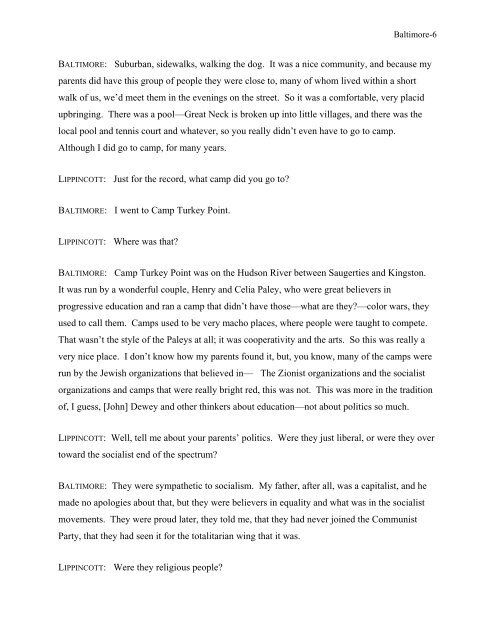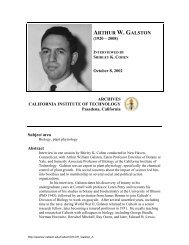Interview with David Baltimore - Caltech Oral Histories
Interview with David Baltimore - Caltech Oral Histories
Interview with David Baltimore - Caltech Oral Histories
Create successful ePaper yourself
Turn your PDF publications into a flip-book with our unique Google optimized e-Paper software.
<strong>Baltimore</strong>-6<br />
BALTIMORE: Suburban, sidewalks, walking the dog. It was a nice community, and because my<br />
parents did have this group of people they were close to, many of whom lived <strong>with</strong>in a short<br />
walk of us, we’d meet them in the evenings on the street. So it was a comfortable, very placid<br />
upbringing. There was a pool—Great Neck is broken up into little villages, and there was the<br />
local pool and tennis court and whatever, so you really didn’t even have to go to camp.<br />
Although I did go to camp, for many years.<br />
LIPPINCOTT: Just for the record, what camp did you go to<br />
BALTIMORE: I went to Camp Turkey Point.<br />
LIPPINCOTT: Where was that<br />
BALTIMORE: Camp Turkey Point was on the Hudson River between Saugerties and Kingston.<br />
It was run by a wonderful couple, Henry and Celia Paley, who were great believers in<br />
progressive education and ran a camp that didn’t have those—what are they—color wars, they<br />
used to call them. Camps used to be very macho places, where people were taught to compete.<br />
That wasn’t the style of the Paleys at all; it was cooperativity and the arts. So this was really a<br />
very nice place. I don’t know how my parents found it, but, you know, many of the camps were<br />
run by the Jewish organizations that believed in— The Zionist organizations and the socialist<br />
organizations and camps that were really bright red, this was not. This was more in the tradition<br />
of, I guess, [John] Dewey and other thinkers about education—not about politics so much.<br />
LIPPINCOTT: Well, tell me about your parents’ politics. Were they just liberal, or were they over<br />
toward the socialist end of the spectrum<br />
BALTIMORE: They were sympathetic to socialism. My father, after all, was a capitalist, and he<br />
made no apologies about that, but they were believers in equality and what was in the socialist<br />
movements. They were proud later, they told me, that they had never joined the Communist<br />
Party, that they had seen it for the totalitarian wing that it was.<br />
LIPPINCOTT: Were they religious people

















